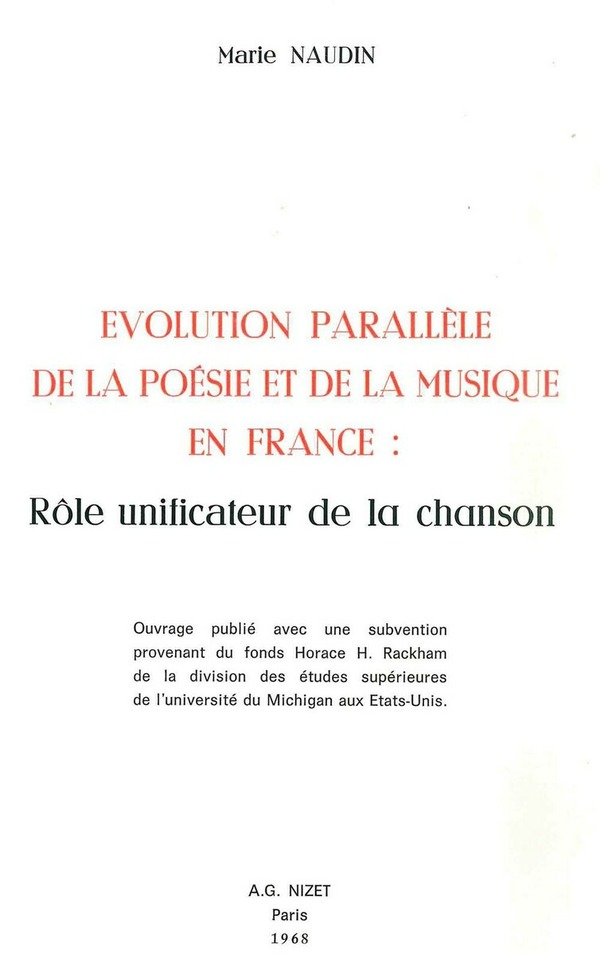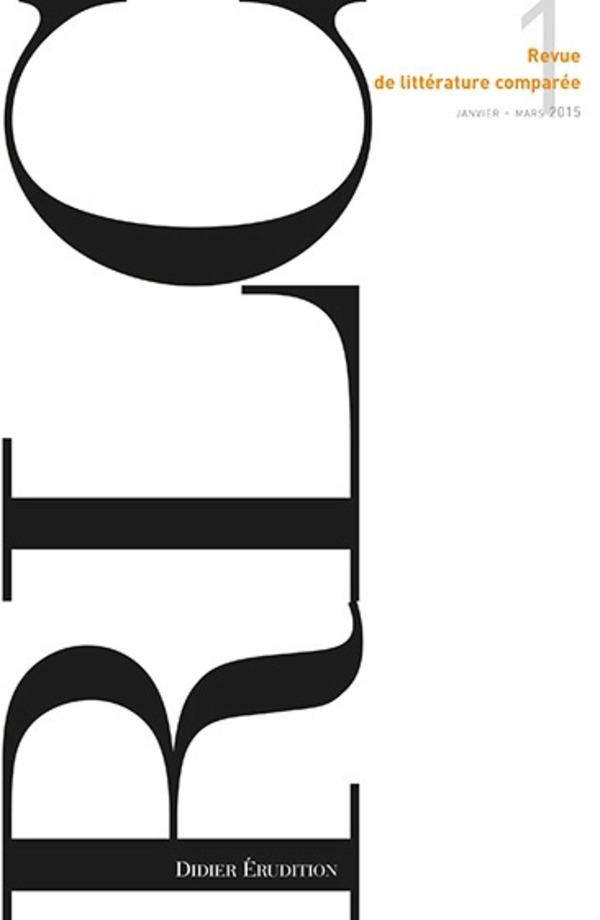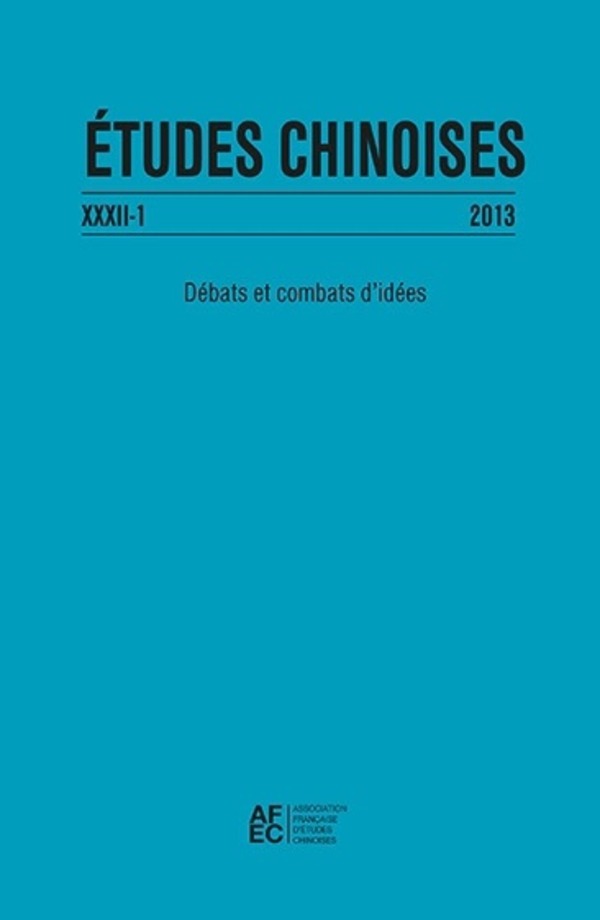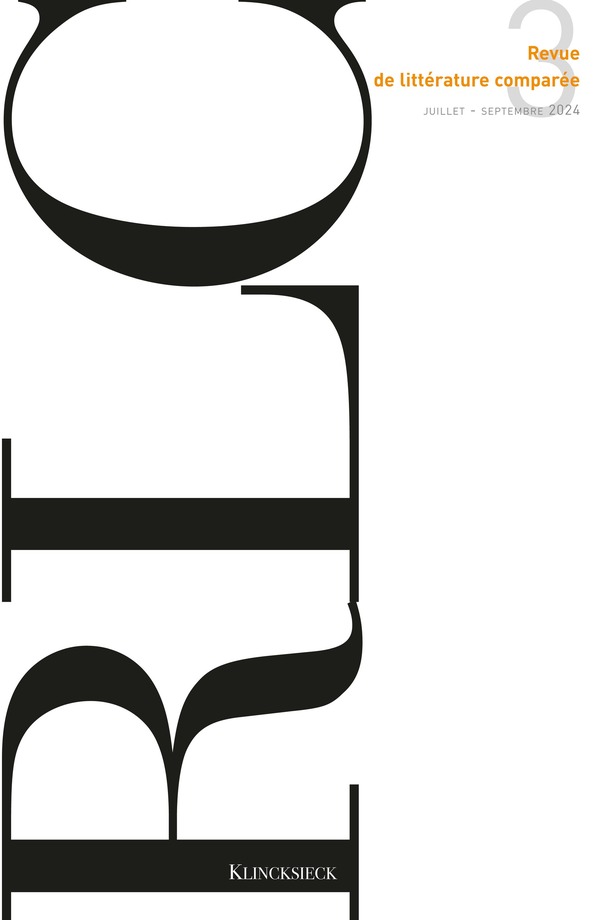Études chinoises XXXI-1 (2012)
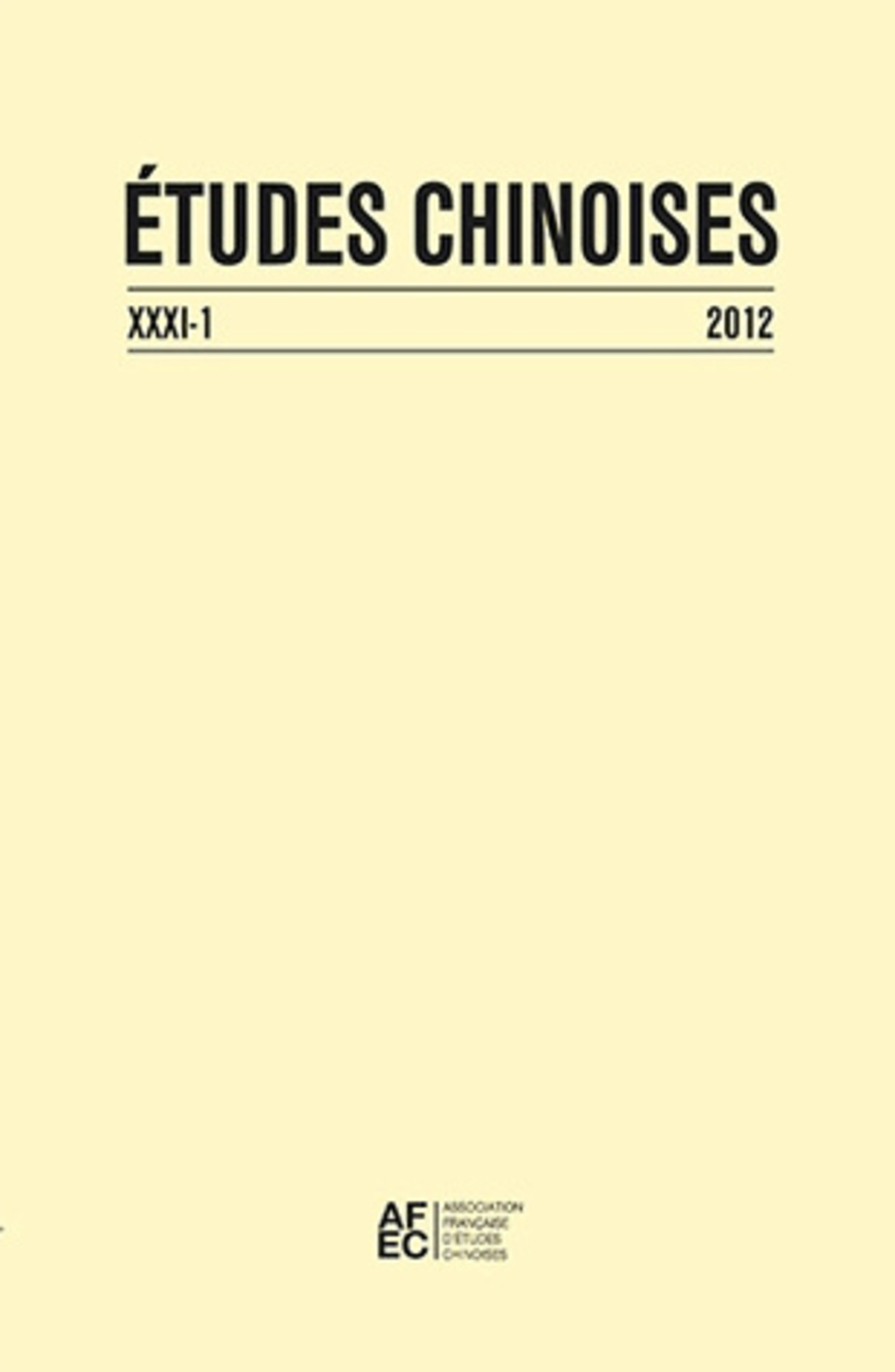
- 208 pages
- Livre broché
- 15 x 21 cm
- Études chinoises
- Parution : 25/11/2012
- CLIL : 3146
- EAN13 : 9782252038765
- Code distributeur : 46044
Présentation
Publiée deux fois par an avec le concours du Centre d'études sur la Chine moderne et contemporaine (UMR8173) de l'École des hautes études en sciences sociales, du Centre de recherche sur les civilisations de l'Asie orientale (UMR8155) et de l'Institut des hautes études chinoises du Collège de France.
Directrice de la publication : Samia Ferhat, présidente de l'Association française d'études
chinoises.
Rédacteur en chef : Damien Chaussende.
Comité de rédaction : Catherine Despeux, Guillaume Dutournier, Danielle Elisseeff, John
Finlay, Stéphanie Homola, Esther Lin, Alexis Lycas, Thierry Pairault, Xavier Paulès,
Muriel Peytavin-Baget, Michèle Pirazzoli-t'Serstevens, Delphine Spicq, Soline Suchet.
Comité de lecture : Brigitte Baptandier, Marianne Bastid-Bruguière, Joël Bellassen,
Sébastien Billioud, Caroline Bodolec, Michel Bonnin, Michel Cartier, Karine Chemla,
Yves Chevrier, Sébastien Colin, Stéphane Corcuff, Roger Darrobers, Catherine Despeux,
Jean-Pierre Diény, Pierre-Henri Durand, Vincent Durand-Dastès, Noël Dutrait, Danielle
Elisseeff, Christophe Falin, Luca Gabbiani, Gilles Guiheux, Jean-François Huchet, Anne
Kerlan, Christian Lamouroux, Isabelle Landry-Deron, Jean Levi, Béatrice L'Haridon,
Sandrine Marchand, François Martin, Frédéric Obringer, Thierry Pairault, Xavier Paulès,
Alain Peyraube, Michèle Pirazzoli-t'Serstevens, Pénélope Riboud, Alain Roux, Françoise
Sabban, Isabelle Thireau, Léon Vandermeersch, Françoise Wang-Toutain, Pierre-Étienne
Will, Xiaohong Xiao-Planes, Xu Dan, Yinde Zhang, Nicolas Zufferey.
Consulter la table des matières
Études Chinoises vol. XXXI-1 (2012)
Yinde Zhang : La sinologie en Chine aujourd'hui : un champ spéculaire et spéculatif
Thomas Tabery : Le fonds chinois de la Bibliothèque d'État de Bavière : du premier inventaire à l'ère numérique (xviie-xxie siècles)
Notes de recherche
Wang Huayan : Cui Fujun : un protecteur des empereurs du xe au xiie siècle ?
Zhang Chao : Les grand-mères vulgaires : l'évolution d'une représentation féminine du bouddhisme Chan
Daniela Campo : La question de l'âge du maître Chan Xuyun (env. 1864-1959)
Sylvie Beaud : Un « fossile vivant » de la culture nuo nationale : réflexion sur la désignation de nuoxi appliquée au Guan Suo xi
Ma Jun : Liang Qichao et les institutions républicaines
Yang Chen : La mobilité résidentielle dans un quartier ouvrier de Shanghai : le cas du nouveau village de Caoyang
Vanessa Teilhet : La ville à conquérir dans les récits de Qiu Huadong des années 1990
Comptes rendus
Lucien Bianco, La Révolution fourvoyée : parcours dans la Chine du xxe siècle (Alain Roux), p. 155 • C. Fred Blake, Burning Money: The Material Spirit of the Chinese Lifeworld (Vincent Goossaert), p. 157 • Lucille Chia, Hilde de Weerdt (ed.), Knowledge and Text Production in an Age of Print: China, 900-1400 (Michela Bussotti), p. 159 • Jeffrey W. Cody, Nancy S. Steinhardt, Tony Atkin (ed.), Chinese Architecture and the Beaux-Arts (Lingqiong Xie-Fouques), p. 165 • John W. Dardess, Ming China, 1638-1644: A Concise History of a Resilient Empire (Lynn Struve), p. 169 • Catherine Despeux (dir.), Médecine, religion et société dans la Chine médiévale (Georges Métailié), p. 174 • Luca Gabbiani, Pékin à l'ombre du Mandat Céleste (Lucie Olivová), p. 178 • Romain Graziani (présentation, traduction, annotation), Écrits de Maître Guan. Les Quatre traités de l'Art de l'esprit (Jean Levi), p. 181 • Jin Dalu, Feichang yu zhengchang : Shanghai "Wenge" shiqi de shehui shenghuo (Olivier Marichalar), p. 186 • Sandrine Marchand, Sur le fil de la mémoire : Littérature taïwanaise des années 1970-1990 (Isabelle Rabut), p. 188 • Peng Hsiao-yen, Dandyism and Transcultural Modernity (Sandrine Marchand), p. 191 • Philippe Postel (édition critique), Victor Segalen, Chine. La Grande Statuaire (Esther Lin-Rosolato), p. 195.
English Abstracts
Yinde ZHANG : La sinologie en Chine aujourd'hui : un champ spéculaire et spéculatif
Résumé — L'engouement auquel on assiste actuellement en Chine pour les études dites « sinologie à l'étranger » ou « sinologie d'outre-mer », telle que celle-ci est pratiquée à l'étranger, nécessite un état des lieux, qui permettra d'observer un champ disciplinaire en constitution. Le développement de ce domaine émergent n'est pas sans susciter des interrogations, qui portent sur sa légitimité, problématisée par sa connexion avec un savoir de nature orientaliste, traité de « sinologiste ». Les débats révèlent l'ambivalence et les tensions qui règnent sur les travaux universitaires, partagés entre la critique de la domination et le désir de se réapproprier un objet propice au rayonnement du patrimoine national.
Yinde Zhang, Sinology in China Today: A Field of Reflections and Speculation
The enthusiasm we see in China today for so-called "foreign sinology" or “overseas sinology”—sinology as it is practiced abroad—calls for a state-of-the-field study that would allow us to observe a discipline in the process of formation. The development of this emerging field raises questions that bear on its legitimacy, which is problematized by its connection with learning of an Orientalist nature still considered as “sinological.” The debate reveals the ambivalence and the tensions in play in academic studies, which are divided between criticism of this domination and the desire to reappropriate a field contributing to the enhancement of Chinese national patrimony.
Thomas Tabery, Le fonds chinois de la Bibliothèque d'État de Bavière Du premier inventaire à l'ère numérique (xviie-xxie siècles)
Résumé — La Bibliothèque d'État de Bavière (Bayerische Staatsbibliothek), grande bibliothèque universaliste située à Munich en Allemagne, possède l'un des fonds chinois les plus importants et les plus précieux d'Europe. L'article esquisse les étapes les plus importantes de son évolution, ainsi que son profil actuel, en mettant notamment l'accent sur les possibilités de recherche bibliographique en ligne et les projets de numérisation qui le concerne. En 2015, la plus grande part du fonds ancien chinois de la bibliothèque devrait être intégralement numérisée et accessible en ligne gratuitement.
Thomas Tabery, The Chinese Holdings of the Bavarian State Library: From the First Inventory to the Digital Era (17th-21st Centuries)
The Bavarian State Library (Bayerische Staatsbibliothek), the great universal library located in Munich, Germany, possesses one of the most important and precious Chinese collections in Europe. This article outlines the most important stages of its evolution as well as its present state, specifically putting the emphasis on the potential for bibliographic studies online and related digital projects. In 2015, the great majority of the early Chinese collection of the library should be completely digitized and accessible free of charge online.
Wang Huayan, Cui Fujun : un protecteur des empereurs du xe au xiie siècle ?
Résumé — Le culte de Cui Fujun est d'abord attesté dans le voyage aux enfers de l'empereur Tang Taizong, dont une copie est conservée dans un manuscrit de Dunhuang daté de 906. Notre hypothèse fait de l'essor de ce culte durant le xe siècle la conséquence d'une politique centrale apparemment influencée par plusieurs événements historiques. En effet le rôle joué par Cui Fujun dans la libération des enfers de Tang Taizong, qui était coupable de fratricide, aurait incité Song Taizong, lui-même accusé d'avoir illégitimement ravi le trône à son frère et à ses descendants, à promouvoir son culte. Cette fonction de protection des empereurs aurait ainsi été réactivée tout au long de la dynastie, en particulier lorsque survinrent des difficultés dans la dévolution du pouvoir.
Wang Huayan, Cui Fujun: A Protector of Emperors from the 10th to the 12th Centuries?
The cult of Cui Fujun is first documented in Tang Taizong's Journey to Hell, which is preserved in a manuscript from Dunhuang dated 906. The argument presented here takes the rise of this cult during the 10th century as the result of central policies apparently influenced by several historic events. Effectively, the role played by Cui Fujun in the freeing of Tang Taizong—who was guilty of fratricide—from Hell would have inspired Song Taizong, himself accused of having illegally seized the throne from his brother and his descendents, to promote his worship. This function of imperial protector would have thus been reactivated throughout the dynasty, in particular when difficulties arose in the imperial succession.
Zhang Chao, Les grand-mères vulgaires : l'évolution d'une représentation féminine du bouddhisme Chan
Résumé — Il existe dans la littérature du bouddhisme Chan une catégorie de personnages excentriques – de vieilles femmes issues des couches sociales les plus basses – appelées communément « grand-mères ». Après avoir présenté un prototype de grand-mères pour la période des Tang, nous étudions le cas de la « Vertueuse grand-mère Yu » (Yu Daopo) des Song, cas extrait des « mélanges » du Chan (Chanlin biji). Ensuite, une étude comparative de ces deux profils est menée afin de mesurer l'évolution de cette représentation féminine.
Zhang Chao, Lower-class Grandmothers: The Evolution of a Female Representation in Chan Buddhism
There exists in the literature of Chan Buddhism a category of eccentric characters—old women from the lowest levels of society—commonly referred to as “grandmothers. After presenting a prototype of grandmothers from the Tang period, this article studies the case of the “Virtuous Grandmother Yu” (Yu Daopo) of the Song, a case taken from Chan “miscellaneous notes” (chanlin biji). Finally, a comparative study of the two profiles is undertaken to measure the evolution of this depiction of women.
Daniela Campo, La question de l'âge du maître Chan Xuyun (env. 1864-1959)
Résumé — Dans cette note de recherche, nous revenons sur la question de l'âge du maître du bouddhisme chinois Xuyun (env. 1864-1959) pour démontrer que la date de naissance de 1840 fournie par son autobiographie et généralement acceptée est fausse. En nous appuyant sur des sources historiques, nous reconstituons la genèse d'un mythe dans ses phases successives afin d'en comprendre les motivations.
Daniela Campo, The Question of the Age of the Chan Master Xuyun (ca. 1864-1959)
In this research note, we return to the question of the age of the Chinese Buddhist master Xuyun (ca. 1864-1959) in order to demonstrate that the birth date of 1840 furnished by his autobiography and generally accepted is actually false. Based on historical sources, we reconstruct the birth of this myth in its successive phases in order to understand its motivations.
Sylvie Beaud, Un « fossile vivant » de la culture nuo nationale : réflexion sur la désignation de nuoxi appliquée au Guan Suo xi
Résumé — Cette note de recherche examine la notion de nuoxi, généralement rendue par « théâtre d'exorcisme », dans son usage contemporain. Depuis que les théâtres de masques ont fait leur réapparition dans les campagnes chinoises à partir des années 1980, nuoxi est en effet constamment employé alors que sa définition a suscité maints débats. À travers l'exemple du Guan Suo xi, j'analyse la manière dont la notion a été appliquée à ce théâtre de masques local. Puis, je montre comment elle a contribué à la mise en œuvre d'une politique de patrimonialisation à l'échelle nationale. La terminologie a, en effet, joué un rôle déterminant dans la promotion du Guan Suo xi, passant en deux décennies, du statut de « superstition féodale » à celui de patrimoine culturel national. Ceci fut réalisé par un important travail de re-conceptualisation et d'extension sémantique à partir du caractère nuo. La présente contribution se prononce dès lors pour une approche critique et réflexive de l'emploi du terme nuoxi.
Sylvie Beaud, A “Living Fossil” of National Nuo Culture: Reflections on the Designation Nuoxi Applied to the Guan Suo xi
This research note examines the notion of nuoxi , generally rendered as “theater of exorcism” or “ghost opera” in contemporary usage. Since the reappearance of masked drama in the Chinese countryside since the 1980s, the term nuoxi is constantly employed while its definition has raised much debate. Through the example of the Guan Suo xi, I examine the manner in which the notion has been applied to this local masked theater. Then I show how it has contributed to the implementation of a politics of patrimonialization at the national level. The terminology has in effect played a determining role in the promotion of the Guan Suo xi, passing in two decades from the status of “feudal superstition” to that of national cultural patrimony. This has been realized by an important effort at reconceptualization and semantic extension from the character nuo. The present study thus argues in favor of a critical and reflexive approach to the use of the term nuoxi.
Ma Jun, Liang Qichao et les institutions républicaines
Résumé – Au début du xxe siècle, la Chine connaît de profonds changements institutionnels aussi bien durant les dernières années de l'empire mandchou des Qing que sous la république. Les acteurs/penseurs de la politique se lancent alors dans de grands débats intellectuels. Parmi eux, Liang Qichao (1873-1929), dont les idées politiques parcourent un spectre très large, souvent en décalage par rapport aux principaux courants politiques de l'époque, joue un rôle à la fois central et révélateur. Puisant dans les interventions de ce penseur, cette note de recherche traite des débats qui ont porté sur deux problématiques fondamentales de la politique, deux questions largement discutées à l'époque mais relativement peu étudiées de nos jours : celle de la forme de l'État (guoti) et celle de la forme du gouvernement (zhengti). Notre propos est autant de clarifier ces notions que de revisiter les aspects non révolutionnaires des changements intervenus à la fin des Qing et au début de la République de Chine.
Ma Jun, Liang Qichao and Republican Institutions
At the beginning of the 20th century, China underwent profound institutional changes both during the last years of the Manchu Qing empire as well as under the Republic. The political players and thinkers threw themselves into the major intellectual debates of the day. Among them, Liang Qichao (1873-1929), whose political ideas covered a wide spectrum, often out of step with the principal political currents of the period, played a role at once central and revealing. Delving into the writings of this thinker, this research note discusses the debates that have a bearing on the two fundamental problematics of politics, two questions widely discussed in the period but relatively little studied in our times: that of the form of the state (guoti) and that of the form of government (zhengti). This article proposes as much to clarify these notions as to revisit the non-revolutionary aspects of the changes that occurred at the end of the Qing and the beginning of the Republic of China.
Yang Chen, La mobilité résidentielle dans un quartier ouvrier de Shanghai : le cas du nouveau village de Caoyang
Résumé — Depuis la fin des années 1990, la réforme des entreprises d'État et l'essor du marché immobilier ont suscité une grande mobilité résidentielle dans des quartiers ouvriers à Shanghai. Dans cette étude de cas consacrée au village Caoyang n° 1, nous interrogeons deux groupes d'habitants (les habitants d'origine et les migrants ruraux) sur trois questions liées à leur mobilité résidentielle : les modalités et les causes de cette mobilité, ses conditions (les réseaux sociaux) et ses conséquences (l'intégration des migrants ruraux).
Yang Chen, Residential Mobility in a Residential Neighborhood of Shanghai: The Case of the New Village of Caoyang
Since the end of the 1990s, the reform of state-owned enterprises and the boom in the real-estate market have given rise to high levels of residential mobility in the working-class neighborhoods of Shanghai. In this case study focusing on the village of Caoyang No. 1, we ask two groups of inhabitants (the original inhabitants and rural migrants) three interrelated questions about their residential mobility: the modalities and reasons for this mobility, its conditions (its social networks), and its consequences (the integration of rural migrants).
Vanessa Teilhet, La ville à conquérir dans les récits de Qiu Huadong des années 1990
Résumé — Dans les années 1990, le romancier chinois Qiu Huadong (1969-) fait l'expérience de la ville en s'installant à Pékin, expérience qu'il fait vivre aux personnages des récits qu'il écrit au cours de cette période. Ces protagonistes, fraîchement débarqués dans la ville, la considèrent comme une personne à part entière qu'il s'agit de séduire et de conquérir afin qu'elle offre tout ce qu'elle semble leur promettre. Mais les désillusions surviennent et, avec elles, des images angoissantes et fantasmagoriques de la ville révèlent la situation fragile du nouveau citadin, celle d'un intrus dans la ville.
Vanessa Teilhet, The City to Conquer in the Stories of Qiu Huadong in the 1990s
In the 1990s, the Chinese novelist Qiu Huadong (b. 1969) experienced life in the city by moving to Beijing, an experience that he brings to life in the characters of the stories that he wrote during this period. His protagonists, newly arrived in the city, consider it as a character in its own right, one which must be seduced and conquered in order to offer all that it seems to promise them. But disillusionment occurs and, with it, harrowing and phantasmagorical images of the city reveal the fragile situation of the newly-arrived citizen, that of an intruder in the city.

